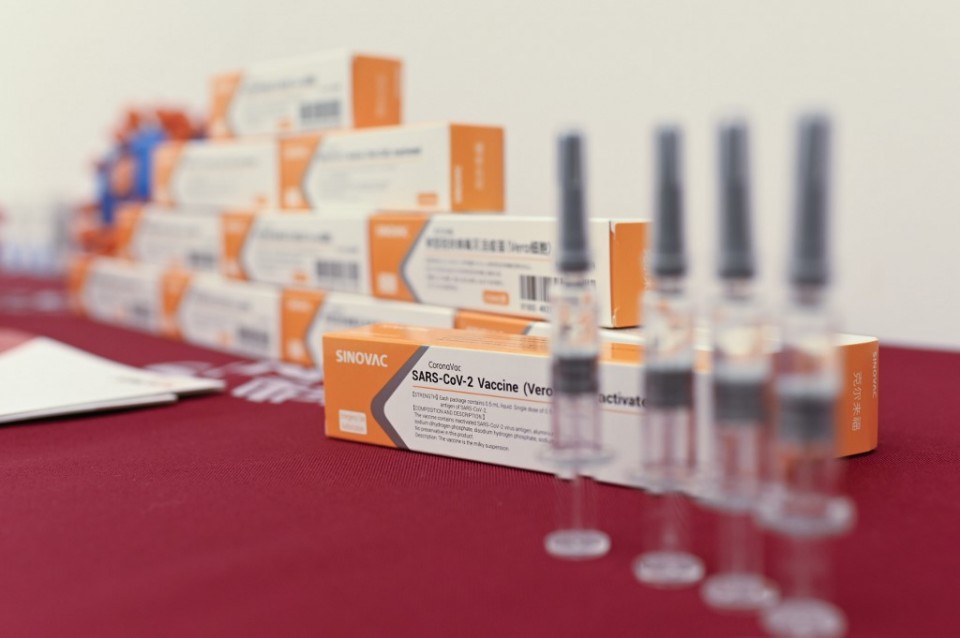
(Eagle News) – The Philippine government’s Inter-Agency Task Force against Emerging Infectious Diseases (IATF) has approved the use of China’s Sinovac vaccines for health care workers.
Presidential Spokesperson Harry Roque said that the IATF approved the recommendation of the National Immunization Technical Advisory Group (NITAG)
Roque said that the Department of Health’s Technical Advisory Group is also giving medical frontliners the option to choose the vaccine they want.
“Sinabi nga sa briefing ng DOH kasama ang NITAG kahapon na ligtas ang bakuna na Sinovac. Ito ay safe vaccine at mapapakinabangan or beneficial ito sa health care workers (The DOH, together with the NITAG, in a briefing yesterday had said that Sinovac vaccine is safe, It is beneficial to health care workers),” he said on Saturday, Feb. 27.
Roque said that since health workers can opt not to use Sinovac if they prefer another vaccine, this will be no problem as they will stay in the priority list.
“Walang sapilitan. Walang mahuhuli sa pila. Walang mawawala sa pila (Nothing is compulsory. No one will be removed from the line)” he said.
-Freedom to choose vaccine type for health workers-
Roque said that there is just a change in protocol that will give freedom to health workers to choose the vaccines they want.
“Ang pagbabago po sa ating protocol: Kung ayaw po ng health care worker ang Sinovac, pupuwede po siyang tumanggi at hindi mawawala iyong kaniyang prayoridad kapag dumating na iyong bakunang gusto niya – pero pang-health care workers lang po iyan ha
(The change in our protocol [is that] if a health care worker does not want to be immunized with Sinovac, he can refuse this vaccine. He won’t be removed from the priority list if the vaccine that he wants arrives. But this option is only given to health workers),” he said.
For other sectors, they have to receive the vaccines that are available. If they don’t want to refuse, it’s okay. They won’t be forced, Roque said.
“Sa lahat po, kinakailangan pa rin talaga kung ano ang naririyan ay tatanggapin natin, kung ayaw naman po ay wala talagang sapilitan.”
Roque said that President Rodrigo Duterte and Senator Christopher “Bong” Go will personally welcome the arrival of the 600,000 doses of Sinovac vaccines this afternoon. The shipment is expected to arrive around 5 p.m., today, Sunday, Feb. 28.
The vaccines were donated by the Chinese government, and would be given for free.
Among those to get the jabs are the members of the military and the so-called economic frontliners. While health care workers are prioritized to receive any of the vaccines that will enter the country, including Sinovac, the Food and Drug Administration (FDA) initially said that it is not recommending the SInovac vaccines to medical frontliners citing the initial phase 3 clinical trials on health care workers that showed Sinovac had 50.4 percent efficacy.
-FDA clarification-
But the FDA later clarified their recommendation, saying that this is not meant to prevent health care workers from getting the SInovac vaccines if they want to.
Health authorities also stressed that the Sinovac vaccines have a high efficacy of more than 90 percent in preventing severe COVID-19 disease, and that these were even 100 percent effective that that they can prevent one from being hospitalized.
They clarified that the 50.4 percent efficacy on health care workers in the clinical trial on health frontliners in Brazil, only meant that there was still a portion of those that underwent the trial that got COVID-19, but symptoms were milder.
They said these were still about a hundred percent effective in preventing severe forms of the disease.
The FDA also recommended the Sinovac vaccines for those aged 18 to 59 years old. It said the vaccines are also safe to use by those with a history of allergies. Those given Sinovac jabs in other countries have not reported any severe adverse reaction to the jabs.
Among the world leaders who publicly got the shot were Indonesian President Joko Widodo and Hong Kong chief executive Carrie Lam. The vaccines were also given to health care workers in other countries, as well as to senior citizens.
(Eagle News Service)







